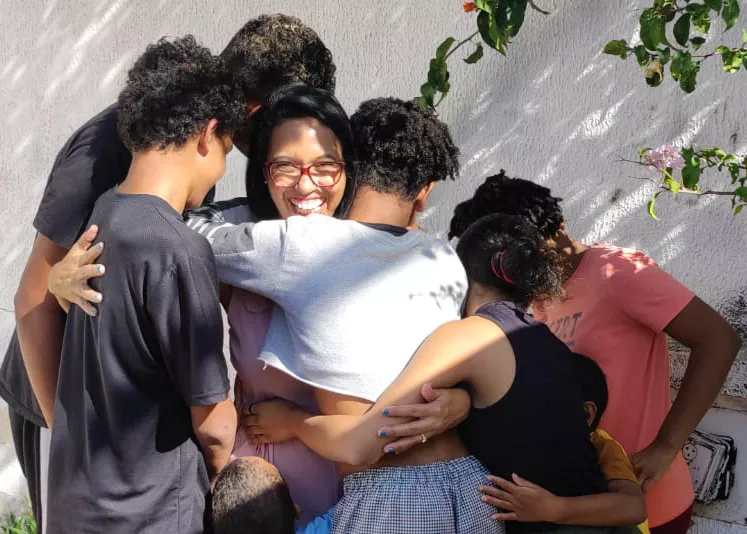SOS Mother in Brazil navigates mental health with 11 children in her care

At 52, Rosa takes on a new responsibility, caring for two children and nine teenagers. But it's not just the number that makes the difference, but the unique mix of age groups, each with their own needs and complexities. Additionally, many children in her care have mental health issues, such as behavioural and learning disorders, making Rosa's role even more important.
For Rosa, education is a top priority. She sees herself as an educator, imparting values and life lessons. "I tell them, 'I take care of you. You must go to school. You don't have to fight at school. You must respect each other at home. You are siblings at home, and you must be respectful. We are one family."
What stands out about Rosa is her commitment to respecting each person’s individuality. She believes in allowing every child and young person the space and time they need to develop.
She began her work at SOS Children’s Villages 28 years ago when she responded to a job advertisement in Paraná, Brazil, not fully comprehending how this decision would reshape her life. Over the years, her house has become a home for numerous children, many of whom are now adults. Her greatest joy lies in witnessing their happiness and successes.
Her advice is simple yet profound, "Don't live in the past; set goals for the future."
Recalling her early days when she managed a household with young children, Rosa admits that despite her background in education, becoming an SOS Mother was an entirely new challenge. However, she quickly adapted and embraced her responsibilities, considering them a new way of life. "After three months working at SOS Children’s Villages, I took over a home. I learned a lot at the beginning. It wasn't easy, but I learned. I grew with them," she reflects.
Today, Rosa creates a loving home for the children in her care. Special moments like vacations and birthdays are cherished occasions that bring joy to her family. She prepares delightful dishes, including typical Brazilian meals like feijoada, rice with raisins, mayonnaise, and farofa. She even allows the children to stay up late on these special days, fostering a sense of togetherness and celebration.
Rosa's optimism has carried her through numerous challenges, including one of her most difficult experiences. "Some time ago, I had a child at home, and the doctor told me, 'Look, there is no way; he is going to die.' But I decided that we were going to fight. I looked at that little baby and told him, 'If you help yourself and I help you, you will not die.' And that's how it went for ten months, staying up all night with that child amid numerous hospitalizations and surgeries. Today, he is fine, thanks to God," Rosa recounts.
Rosa's strength lies not only in her unwavering dedication but also in her self-care routines. She understands the importance of looking after herself, including regular visits to a beauty salon, which she considers a form of personal therapy. Additionally, she benefits from the professional support of SOS Children’s Villages teams, who maintain daily contact and conduct weekly visits.
In Brazil, caregivers like Rosa receive support from multidisciplinary teams comprising of professionals who regularly visit their homes. "We have a team made up of a psychologist, a social worker, and a pedagogue, and each team is responsible for two homes," explains Javier, a psychologist at SOS Children's Villages Brazil.
These teams extend invaluable support to children, adolescents, and young people dealing with mental health challenges, offering guidance and strategies to help them overcome their difficulties. Javier elaborates:
"The team's work begins with a first contact with the people living in the homes to understand how they work and what the dynamics of the house and each person are. That is one of the characteristics of our work, to be attentive to what they express and to be able to guide them toward other services that can provide them with specific mental health care."
In cases like Rosa's, where daily telephone contact is maintained and periodic visits from the team occur, a holistic approach to care is emphasized. Javier adds, "It is important to take into account other elements, such as nutrition, physical activity, and the development of healthy relationships."
While the smell of a meal floats in the air, Rosa and her family gather to share a special moment together. Rosa is an example of resilience and determination.
In line with our commitment to holistic support, SOS Children’s Villages organizes workshops on mental health and stress management. These workshops aim to reinforce psychosocial support processes and provide tools for self-management of stress, especially in difficult situations. Through these initiatives, SOS Children’s Villages supports caregivers like Rosa, ensuring their work is recognized and appreciated.
